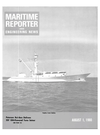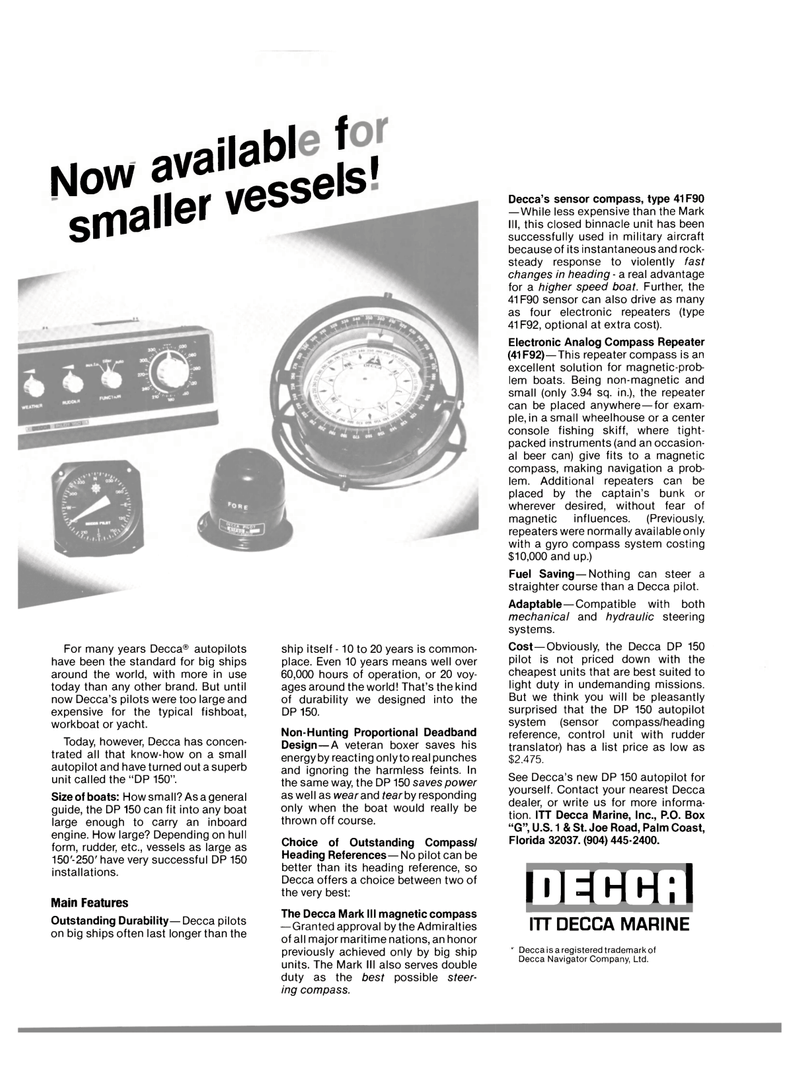
Page 15: of Maritime Reporter Magazine (August 1980)
Read this page in Pdf, Flash or Html5 edition of August 1980 Maritime Reporter Magazine
Now smalle' ^fs'sefs' Decca's sensor compass, type 41F90 —While less expensive than the Mark
III, this closed binnacle unit has been successfully used in military aircraft because of its instantaneous and rock- steady response to violently fast changes in heading - a real advantage for a higher speed boat. Further, the 41F90 sensor can also drive as many as four electronic repeaters (type 41F92, optional at extra cost).
Electronic Analog Compass Repeater (41F92)—This repeater compass is an excellent solution for magnetic-prob- lem boats. Being non-magnetic and small (only 3.94 sq. in.), the repeater can be placed anywhere—for exam- ple, in a small wheelhouse or a center console fishing skiff, where tight- packed instruments (and an occasion- al beer can) give fits to a magnetic compass, making navigation a prob- lem. Additional repeaters can be placed by the captain's bunk or wherever desired, without fear of magnetic influences. (Previously, repeaters were normally available only with a gyro compass system costing $10,000 and up.)
Fuel Saving—Nothing can steer a straighter course than a Decca pilot.
Adaptable—Compatible with both mechanical and hydraulic steering systems.
Cost—Obviously, the Decca DP 150 pilot is not priced down with the cheapest units that are best suited to light duty in undemanding missions.
But we think you will be pleasantly surprised that the DP 150 autopilot system (sensor compass/heading reference, control unit with rudder translator) has a list price as low as $2,475.
See Decca's new DP 150 autopilot for yourself. Contact your nearest Decca dealer, or write us for more informa- tion. ITT Decca Marine, Inc., P.O. Box "G", U.S. 1 & St. Joe Road, Palm Coast,
Florida 32037. (904) 445-2400.
For many years Decca® autopilots have been the standard for big ships around the world, with more in use today than any other brand. But until now Decca's pilots were too large and expensive for the typical fishboat, workboat or yacht.
Today, however, Decca has concen- trated all that know-how on a small autopilot and have turned out a superb unit called the "DP 150".
Size of boats: How small? As a general guide, the DP 150 can fit into any boat large enough to carry an inboard engine. How large? Depending on hull form, rudder, etc., vessels as large as 150'-250' have very successful DP 150 installations.
Main Features
Outstanding Durability—Decca pilots on big ships often last longer than the ship itself -10 to 20 years is common- place. Even 10 years means well over 60,000 hours of operation, or 20 voy- ages around the world! That's the kind of durability we designed into the
DP 150.
Non-Hunting Proportional Deadband
Design—A veteran boxer saves his energy by reacting only to real punches and ignoring the harmless feints. In the same way, the DP 150 saves power as well as wear and tear by responding only when the boat would really be thrown off course.
Choice of Outstanding Compass/
Heading References—No pilot can be better than its heading reference, so
Decca offers a choice between two of the very best:
The Decca Mark III magnetic compass — Granted approval by the Admiralties of all major maritime nations, an honor previously achieved only by big ship units. The Mark III also serves double duty as the best possible steer- ing compass.
EHHHU
ITT DECCA MARINE • Decca is a registered trademark of
Decca Navigator Company, Ltd.

 14
14

 16
16
